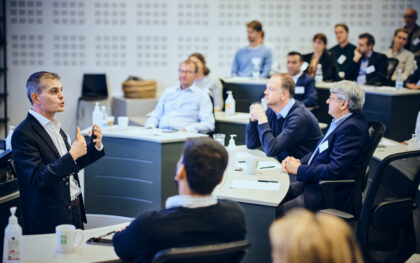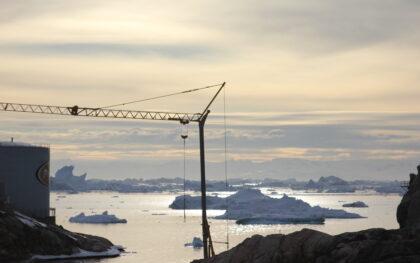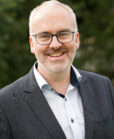Master in Sustainable Leadership

Driving Sustainable Change
The Master in Sustainable Leadership will enable you to drive the sustainability agenda in your organization. It will equip you with the leadership skills, confidence, and mindset to understand and navigate the complexities around sustainability, as well as the tools to design, execute, and lead others in implementing sustainability solutions.
The programme will enable you to:
• Create an understanding of the motivation and mindset needed to lead change
• Analyse and understand complex sustainability challenges and problem interconnectivity
• Lead the design of sustainability solutions
• Execute and lead others in the implementation of sustainability solutions
Find the 2024/2025 academic year study plan here.
View the upcoming events organized by Master in Sustainable Leadership programme.
Why take a Master in Sustainable Leadership?
Solving sustainable change is complex and full of trade-offs. There is a pressing need for future leaders to have an embedded sustainability mindset to be able to solve complex sustainability challenges.
The Master in Sustainable Leadership is a journey of personal and professional transformation. You are investing in both your and your company’s ability to drive sustainability solutions, as well as your own inner development skills to leverage this knowledge, lead others, and bring about positive change. The programme’s main learning goals are:

You will do this in a highly valuable knowledge-sharing network through your classmates, faculty, immersive learning partners, and the DTU Executive Education alumni association.
Personalized for your career and work challenges
The Master in Sustainable Leadership follows an ‘Immersive Learning’ approach, throughout the programme. This means that all your assignments and cases are focused not only on enhancing your knowledge but also on having a direct and positive impact on a real-world challenge. And can, in a large part, be implemented in your daily work life from day one.
Immersive Learning in Each Course
Each course is grounded in real-world challenges, meaning you will learn academic content in a practical context. This can take several forms, including:
• Simulations of sustainability challenges within real companies or contexts
• Sessions in a non-classroom environment
• Projects within your own company
• Projects with a partner organization
• Study trips to local, Nordic, or global partners
Immersive Learning Project
You will work on an Immersive Learning Project which corresponds to a master’s thesis. Unlike traditional degree programmes which typically include a thesis project in the end, you will work on your project throughout the entire duration of the programme. Every course links to the next step that you will take in your Immersive Learning Project, which will be a sustainability-related project preferably within your host organization. The aim is for your project to be successfully implemented within your organization by the end of the programme, so that you are already creating tangible impact.
Personal Leadership Development
As you move through courses and the Immersive Learning Project, you will develop your personal leadership capacity through a Personal Leadership Development plan. This includes intentionally practicing skills, such as facilitation and coaching, as part of each course. It also includes identifying when you are or can be using leading tools in your daily work and life, so that your skill development is immersed in your everyday.

Programme structure
Our curriculum gives you a solid foundation of practical business skills and experience combined with applying knowledge in the real world. Teaching formats include case discussions, immersive team simulations, introspective exercises and feedback, real-world projects and group assignments, and study tours.
The programme is divided into four semesters. Find the 2024/2025 academic year study plan here.
Read more about the programme details.

* We are constantly striving to improve the Master in Sustainable Leadership programme and its contents to offer you the newest and most relevant research, knowledge and experiences in rapidly changing markets. Please note that the programme may be subject to change and can be updated continuously.
Class profile
The Master in Sustainable Leadership is designed for leaders and future leaders who wants to be at the forefront of sustainable solutions. This includes:
- Early career executives in private, public, and non-profit sectors alike, determined to solve sustainability challenges in their organizations
- Technology driven entrepreneurs seeking to strengthen their understanding of complex problem solving and operationalizing sustainability
- Intrapreneurs aspiring to lead sustainability transition within their organizations
- Leaders aspiring to gain a holistic and multidisciplinary understanding of sustainability in global business
The Master in Sustainable Leadership aims for a diverse group of participants across sector (private, public, nonprofit), industry, size of organization, and demographics (cultural background, age, and gender). As sustainability is multidisciplinary and complex in nature, it is essential that leaders know how to lead in different societal and cultural contexts, with people from various backgrounds.

Blending knowledge and practice
In order to achieve this innovative goal, the Master in Sustainable Leadership is bringing together a multi-disciplinary learning ecosystem founded by two internationally experienced sustainability experts in their own fields, who have joined forces to create an entirely new programme format: Academic Director Dr. Salla Laasonen and Director of Practice Jackie Stenson.
The aim of the programme is to deliver not only science-based high quality education, but also tangible societal impact. That is what makes the programme innovative in its design, as it builds on two equally strong pillars: academic excellence and impact.
Lifelong network within a professional community
Working together intensively over 21 months creates safe and trusting relationships. You will be part of a network of inspiring classmates with whom you speak the same language, know well from having lived challenging times, and trust to help you with honest opinions and contacts.
The participants will automatically be members of the Alumni Association when they start the Master in Sustainable Leadership programme. The purpose of joining the association is to maintain and expand the close personal relationships established during the course of the programme. This also enlarges each participant’s professional network because it unites members of all classes through course-related activities and discussions on the association’s online platform and LinkedIn group. The alumni association offers year-round events and activities to foster lifelong learning in the areas of leadership, innovation, technology and sustainability, and connection between alumni and external experts.
Admission, practicalities, and finance
Next class starts:
The next class of the Master in Sustainable Leadership begins on 3 March 2025.
The programme is four semesters long and teaching takes place in-person in the Copenhagen region as three- to five-day teaching blocks every month. Teaching will take place both during the week and the weekend.
Admissions:
The academic requirement for joining the DTU Master in Sustainable Leadership programme is that you must have the scope to lead, implement, and/or execute sustainability within your organization, and either experience in sustainability, experience in leadership, or both. You must also have a bachelor or professional bachelor degree in any natural or social science discipline, as well as three to five years of experience. The admission process typically starts with an informal discussion of the programme, and the candidate’s needs and constraints. Once the candidate submits the application, an admission interview is scheduled with the Programme Directors.
Enrollment in the programme cannot be used for residency or visa application purposes. Participants must already be able to be physically present in Denmark at least once a month.
Fee:
The tuition fee for Master in Sustainable Leadership is DKK 190,000 excl. VAT.
The fee includes live cases, networking events and catering, and all materials. Travel costs for study trips are not included. The cost of the programme can be covered by you, your company, or you can arrange to split the cost between both parties. Substantial cost savings can be gained by applying for the Gross Income Tax Credit (bruttolønsordning). For further information, please go to SKAT.dk.
The state subsidy for part-time education is determined in the Finance Act for one year at a time. DTU reserves the right to make any adjustments to the participant payment.
Do you have questions or do you wish to register for the programme? Please send an e-mail to us at learnforlife@dtu.dk or give us a call (+45) 4525 4525.
Our Learning Ecosystem
The Master in Sustainable Leadership is built on a multi-disciplinary learning ecosystem of partners who will collaborate on cases and projects, contribute to cutting-edge knowledge, teach courses, and enable participants to practice their skills in a real-world environment.
These partners represent a variety of stakeholders involved in sustainability solutions, including universities, international organizations, corporations, social organizations, regional and national associations, ecosystem hubs, think-tanks and thought leaders.
Each course is taught by a professor from DTU or a visiting faculty member from one of the world’s leading universities, institutions, or industries. We have several exciting partnerships in our learning ecosystem that we look forward to announcing in the near future
Steering Group and Programme Directors
The Steering Group for the Master in Sustainable Leadership currently consists of members from DTU and Lederne who are both designing the programme’s content and will be teaching faculty on the program.
Programme Modules and Courses
The Master in Sustainable Leadership is a 21 month, part-time programme, and grants the qualification of Master in Sustainable Leadership (60 ECTS). The structure of the programme consists of three modules, all consisting of three 5 ECTS courses. These three modules focus on the following thematic entities:
- Why: What is the underlying motivation and global need for sustainability transformation and leadership?
- How: How can organizations align towards sustainability transformation?
- Execute: How can you execute sustainability strategy in organizations?
Alongside these modules, the participants engage in an Immersive Learning Project (15 ECTS), which corresponds to a master’s thesis.

MODULE 1 – WHY
What is the underlying motivation and global need for sustainability transformation and leadership?
Course 1: Philosophical Foundations of Sustainable Leadership
The first course of the semester focuses on the question:
“What impact do I want to create – for my company and myself?”
Learning goal course 1:
To build a common understanding of sustainable leadership and your personal vision within sustainability.
Key topics of the course:
- Sustainability definitions, concepts and interlinkages
- Global sustainability trends and pressures
- Systems thinking and planetary boundaries
- Leadership frameworks and techniques
- Team building and profiling
- Psychological safety and safe spaces.
Course 2: Leadership in Sustainability Strategy
The second course of the semester focuses on the question:
“How can I align my approach towards creating impact?”
Learning goal course 2:
To analyse the drivers and challenges facing strategic level sustainability commitments
- Key topics of the course:
- Sustainability strategy and value creation
- Sustainability maturity
- Key strategic drivers, including ESG, EU taxonomy, Scope 1/2/3, lifecycle thinking
- Sustainability goal setting and road mapping
- Risk and resilience
- Stakeholder motivations and incentive alignment.
Course 3: Complex Problem Framing across Value Chains
The third course of the semester focuses on the question:
“Where do I start?”
Learning goal course 3:
To identify opportunities and challenges within value chains and frame complex sustainability challenges
Key topics of course 3:
- Sustainable development problem framing
- Root cause analysis within sustainability
- Sustainability and ESG within systems thinking
- Value chain forms and value networks
- Opportunities and challenges within value chains
- Facilitation of complex, non-linear processes.

MODULE 2 – HOW
How can organizations align towards sustainability transformation?
In the HOW module, we will explore how various organizational forms, internal structures, and business models can support the design and implementation of sustainability solutions. We will also focus on innovation for radical business change, as well as entrepreneurial and intrapreneurial mindsets and approaches to driving this change.
Course 4: Sustainability-Oriented Organizations
The first course of the HOW module focuses on the question:
“What can my organization look like in order to drive change?”
Learning goal course 4:
To harness your personal role in the forms that sustainability can take within organizations.
Key topics of the course:
- Strategic, tactical and operational levers for sustainability
- Voluntary codes/standards, certifications, and labelling
- EU taxonomy for organizational connection to sustainability
- Collaborative governance and partnership models
- Organizational culture
- Stakeholder engagement and multi-stakeholder initiatives
Course 5: Business Models for Sustainability
The second course of the HOW module focuses on the question:
“How can I do good and do well at the same time?“
Learning goal course 5:
To turn sustainability into a business model opportunity.
Key topics of the course:
- Global business models for sustainability and inclusive business
- Circularity in business models
- Creating shared value
- Trade-off management and aligning incentives
- Mindset and values for radical business model change
- Personal change agency, resilience, adaptive capacity
Course 6: Sustainability-Driven Innovation
The third course of the HOW module focuses on the question:
“How can I design a sustainability solution for widespread impact?”
Learning goal course 6:
To create innovative sustainability solutions that can be widely adopted.
Key topics of the course:
- Human-centered design, design thinking and inclusive innovation for solution identification and validation
- Innovation in resource constrained environments
- Co-creation and stakeholder and community engagement
- Intrapreneurship business model innovations, and mindset of social intrapreneurs
- Entrepreneurship business model innovations, and mindset of social entrepreneurs
- Designing for radical business model change

MODULE 3 – EXECUTE
How can you execute sustainability strategy in organizations?
In the EXECUTE module, we will turn sustainability data and reporting into decision-making tools as well as communication and stakeholder engagement tools. We will also focus on change management processes, and analyze all the leadership techniques practiced throughout the programme to create your individualized sustainable leadership plans.
Course 7: Data-Based Decision Making
The first course of the EXECUTE module focuses on the question:
“How can I navigate and leverage sustainability data?”
Learning goal course 7:
To build, interpret, and leverage sustainability data for strategic decision making.
Key topics of the course:
- Types of data, data measurement, and quantitative sustainability assessments
- Uses of sustainability data
- ESG and EU taxonomy for reporting and compliance
- Introduction to and interpretation of LCA models and lifecycle screening
- Impact measurement models (output / outcome / theory of change)
- How to engage and challenge existing systems
Course 8: Communicating Sustainability
The second course of the EXECUTE module focuses on the question:
“How do I get others on my team?”
Learning goal course 8:
To translate sustainability solutions to a wider audience and build the capacity to be a sustainability thought leader.
Key topics of the course:
- Types of reporting, including ESG, Scope 1/2/3, Global Compact, Global Reporting Initiative, integrated reporting
- Communicating ESG
- Communicating data outputs
- Types of communication, including pitching and storytelling
- Stakeholder management and aligning incentives
Course 9: Leading Change for Sustainability
The third course of the EXECUTE module focuses on the question:
“How can I be a sustainable leader?”
Learning goal course 9:
To empower others to realize and execute sustainable change.
Key topics of the course:
- Transition and change management
- Aligning incentives for behavior change
- Uses of leadership tools and methods, including analysis of methods practiced throughout the programme
- Leading up, down, and across

Each module is taught by a professor from DTU, a visiting faculty member from one of the world’s leading business schools or from the industry.
DTU Master in Sustainable Leadership Faculty
Collaboration with B Corps in the Nordics
The Nordic B Corp movement will be an integral part of the master’s program in sustainable leadership. The participants in the master’s programme will have the opportunity to work with the certified B Corps through case workshops, guest lectures, and company visits.
The B Corp movement is an international network of companies working to build a more inclusive, equitable and regenerable economy. All companies in B Corp are certified to meet high standards of social and environmental impact by B Lab, a nonprofit organization that develops the standards for corporate responsibility, transparency and legal frameworks for social as well as environmental impacts.
The founder and Executive Director of the Nordic B Corp Movement, Nille Skalts, has over 20 years of experience in facilitating strategic transformations. Her ambition is to enable societal transition towards market driven regeneration by challenging the assumptions of our current unsustainable economic structures and building business models that factor in ecosystem regeneration. Participants of the Master in Sustainable Leadership will have the unique opportunity to engage with Nille and Nordic B Corps on these fundamental challenges, and explore in practice what radical transformations need to take place in order to bring about positive societal impact.
Company project opportunity
Does your company have sustainability ambitions or a sustainability strategy, but you could benefit from support in understanding how to best achieve your sustainability goals and innovate sustainability solutions?
Leadership program is seeking companies with sustainability ambitions, offering FREE assistance to help them understand and achieve their sustainability goals.
The starting point could be a question like “How do we achieve our internal sustainability strategy?” (internal facing question) or “How do we better orient our products/services/client work etc. towards our sustainability ambitions?” (external facing question). The question could be within an entire company or could also be within a specific department/team.
Small groups of Master in Sustainable Leadership participants (mid/late career professionals and leaders working with sustainability within their own organizations) will then help identify the challenge in more detail, barriers to success, and innovation solutions to overcome these barriers.
Benefit from this valuable opportunity at no cost! The total time commitment is approximately 2 days, with around 1 day allocated from March 13 to 15, 2024, and another day spread over May 16 to 17, 2024. See the detailed timelines below.
What you will gain:
- A detailed understanding of the challenges you face to fully act on your sustainability agenda, including the complex sustainability ecosystem in which you operate.
- Innovative solution ideas that overcome your current barriers, and action points to bringing these solutions to life so you can better meet your sustainability goals.
Project requirements:
To participate in this project, you must:
- Have sustainability goals and/or strategy that the company wants to achieve
- Have an initial idea of where the barriers are to achieving your sustainability goals
Additionally, you must meet the following operational requirements:
- Key leadership is willing and able to participate in the project
- More than 5 employees in the company
- Located within one hour of Copenhagen
- Ability to collaborate in English
Expression of interest:
To express your interest in participating in this project, please fill out this form and the Master in Sustainable Leadership Programme Team will be in touch.
For any questions, please contact Sara Sewell at sasew@dtu.dk.
Key dates and timelines:
This project takes place in two parts.
PART 1: Understanding the challenges you face
| Date and time | Location | Description |
| Wednesday 13 March 2024, morning (approx 9.00-12.00) | Company visit | MSL groups (of 3 to 4 participants) visit your company to learn: Overview of companyMeetings with key leadership to understand strategic direction and perceived challenges regarding sustainable transitions |
| Thursday 14 March 2024, morning (approx 9.00-11.00) | Q&A session at company | MSL groups meet with key leadership and other key stakeholders to fill in informational gaps |
| Friday 15 March 2024, afternoon (approx 14.00-16.00) | Final presentations at Lederne | All participating companies join the MSL participants for final presentations on their findings and recommendations |
PART 2: Innovating solutions to meet your sustainability goals
| Date and time | Location | Description |
| Thursday 16 May 2024, most of a day (approx 9.00-15.00) | Company visit – innovation sprint | Full day innovation sprint with company representatives to innovation solutions to the previously defined challenges |
| Friday 17 May 2024, afternoon (approx 13.00-16.00) | Final presentations at DTU Lyngby Campus | ll participating companies join the MSL participants for final presentations and a Friday beer |
08 02 2023 16:30-17:30
Webinar
Info session about Master in Sustainable Leadership
Join us for an introduction to the new Master in Sustainable Leadership. Get an overview of the programme content and structure, meet the Programme Leads, and get answers to your questions.

15 03 2023 16:30-17:30
Webinar
Info session about Master in Sustainable Leadership
Join us for an introduction to the new Master in Sustainable Leadership. Get an overview of the programme content and structure, meet the programme directors, and get answers to your questions.

22 12 2022
Consultancy Project
Need Help Acting On Your Sustainability Strategy?
Does your company have sustainability ambitions or a sustainability strategy, but is struggling to fully act on this agenda? Then you can submit your company to the MSL project and receive consultancy help from the participants of the Master in Sustainable Leadership programme.

11 08 2022 15:00-16:00
Webinar
How to become a B Corp?
A conversation with B Corp in the Nordics and Lakrids by Bülow
Get insights on how to become a part of the B Corp movement, when Nille Skalts, Founder & Executive Director of the Nordic B Corp Movement talks with famous Danish liquorice producer Lakrids by Bülow, who are in the process of being a certified B Corp.

27 April 2022 16:30-17:30
Webinar
Info session about Master in Sustainable Leadership
Join us for an introduction to the new Master in Sustainable Leadership. Get an overview of the programme content and structure, meet the programme directors, and get answers to your questions.

29 April 2022 08:30-17:30
Sustainability Event
Inner Development Goals Summit 2022
How can developing our inner capabilities, qualities and skills accelerate achieving the UN’s
17 Sustainable Development Goals? Come learn about the Inner Development Goals, get inspired, and connect with Danish initiatives on inner development for the SDGs!

10 May 2022 16:30-17:30
Webinar
Info session about Master in Sustainable Leadership
Join us for an introduction to the new Master in Sustainable Leadership. Get an overview of the programme content and structure, meet the programme directors, and get answers to your questions.

11 May 2022 09:30-15:30
Food & Bio Cluster Event
Roundtable | Climate Footprint
on Food, Ingredients and drinks
Do you want to gain deeper insight into carbon footprint calculations? Join us for a roundtable discussion where Master in Sustainability’s Director of Practice Jackie Stenson, Sustainability Engagement Manager Anna Åhnberg & Sustainability LCA Specialist Vasiliki Takou from Oatly will take the participants through useful tools for sustainability leadership.

19 May 2022 17:00-20:00
Master Class
Ethical AI
Lorem ipsum dolor sit amet, consectetur adipiscing elit. Aliquam cursus dui libero, ac commodo est tristique sit amet. Mauris venenatis porta turpis, eget iaculis libero pulvinar sed. Sed at maximus urna. Maecenas scelerisque, enim ac egestas gravida, justo nisi volutpat risus, in aliquet massa est eget nibh

1 June 2022 15:30-16:30
Webinar
Info session about Master in Sustainable Leadership
Join us for an introduction to the new Master in Sustainable Leadership. Get an overview of the programme content and structure, meet the programme directors, and get answers to your questions.

11 August 2022 15:00-16:00
Webinar
Info session about Master in Sustainable Leadership
Join us for an introduction to the new Master in Sustainable Leadership. Get an overview of the programme content and structure, meet the programme directors, and get answers to your questions.

Check back soon!
The events programme for the new year will be announced shortly.

MASTER IN SUSTAINABLE LEADERSHIP APPLICATION PROCESS
Your application consists of the following four parts. These parts give us an opportunity to evaluate your overall fit into the overall outcome and demands of the programme.
- The formal application
This is a simple form with some basic information about you, your current organization, and your experience. - Your updated CV
We would like to see your sustainability and leadership experience and the journey that you have taken in your career thus far. - Transcripts or copies of completed degrees
Please share copies of your previously completed degree or educations. - A motivational letter of maximum 3 pages
This is your space to tell us about yourself and your motivations. Please include:
a. A bit about yourself, including who you are when you are not at work;
b. More details about your current role, and in particular your scope to lead, implement, and/or execute sustainability within your organization;
c. Your current connection to both sustainability and leadership; and
d. Your envisioned ideal future within sustainability and leadership, including desired personal development areas.
Once you submit the full application package, the Programme Director and Coordinator will reach out to schedule an admissions interview prior to making an admissions decision.
Applications are received and processed during the entire year and on a first come, first served basis. Please submit your application by email to Programme Manager Sara Sewell (sasew@dtu.dk) and Programme Coordinator Maria Ingeman (main@dtu.dk).
Impact & Sustainability Blog
Here we discuss trends within sustainability and give a voice to our current participants. Stay tuned as the blog is updated continuously.
Latest article:
Sustainability is Capital Markets Biggest Blind Spot: Recognizing and Addressing Accounting’s Global Challenge
Written by Santiago Isnardi 20/06/2023
Introduction: To gain a comprehensive understanding of the climate change problem and its potential solutions, it is crucial to acknowledge the significant oversight of not incorporating companies’ climate impacts into their mark-to-market value and balance sheet accounting. In my view, this omission represents one of the most significant failures in modern economic history. Although market price discovery has encountered notable shortcomings in recent decades, the failure to account for the extensive influence of companies on climate and sustainability surpasses them all, as I procure to explain below. Luckily, help is on the way, but the solution can create tectonic shifts for industries.
Why we all missed it.
Companies’ excessive climate impacts seemed inconsequential in isolation.
Firstly, our seemingly inoffensive excesses, together with resistance to change, the inertia of established practices and the niceties of modern comfort, have contributed to this sustainability oversight. So, it is our cultural habits and the parabola of the frog being slowly boiled alive. On average and individually, companies’ trespasses may not seem significant, but the total effect of all firms at a global scale, cumulative through time, is. This has led to excessive of greenhouse gas emissions, waste, and increasing depletion of natural resources. It is compromising future generation’s needs; it is not sustainable.
The most influential can have the most negative impacts.
Secondly, the interests of the most powerful entities, with their very global and large dimension, and subsequent market control, conduced to lower competition, and lobby resulted in protection, hindering the sustainable agenda progress. It is important to know that countries and companies with the most influence played a major role on the problem, for they consume and produce the most. There is a strong country variation in the intensity of the climate Impact, for example, how China, US, EU27, and India, impact the environment in the form of emissions is disproportionately high when compared with those countries not making the top ten major emitters. This also applies to the companies that we all buy from. How to decrease the mentioned aggregation, in a granular bottom-up approach at activities and process level is the challenge.
Transcontinental upstream and downstream value chain complexity
Thirdly, geopolitical problems have also made the problem more complex to understand. One example is that while many dominant European companies (for example fast fashion) have little climate impact in Europe (EU), the impact of their factories and suppliers in developing countries is larger than heavy duty emitting manufacturing companies in EU (for ex. Cement production). These transcontinental upstream and downstream value chain complexity (Scope 3 emissions) has also contributed to the formation of the current conundrum and created an international blame game. There is added complexity as, some of the countries with higher emissions (such as India), also have a much more carbon sink, complicating the international interaction.
Comparison to other market oversights:
The failure of markets to include the cost of recycling of hazardous materials end of life and the excessive use of finite resources is almost unparalleled. The damage caused by the excess carbon emissions from fossil fuels, has not been accounted in the carbon sinks procedures, nor priced in the products. It is quite remarkable, because prior instances of market oversights, such as Enron’s financial losses covered by hidden debt, were overlooked by analysts and investors, but the mechanisms were there, trying to account for those metrics. This is not the case for Sustainability.
Similarly, the Financial Crisis debacle of 2007-8 was a cumulation of excessive debt leverage hidden behind securitizations, and derivates. The problem snowballed almost undetected, and it was missed by market users, such as regulators, rating agencies, and governments, until again we came to an almost overnight realization. Here, we also had mechanism that tried to account for metrics of debt and losses, we just missed them. Conversely, in the climate crisis, companies do not need to disclose their emissions. It makes things harder indeed.
“While in previously encountered financial crises, the metrics were obscured and went unnoticed, on the climate crisis, firms did only not need to disclose the information that caused the crisis, but a comprehensive mandatory measurement of climate impact and sustainability did not exist“
The Biggest Blind Spot in Capitalism Modern History:
I believe that sustainability is the largest blind spot in our modern markets’ history. This is especially true, within the realm of accounting. While in previously encountered financial crises, the metrics were obscured and went unnoticed, on the climate crisis, firms did only not need to disclose the information that caused the crisis, but a comprehensive mandatory measurement of climate impact and sustainability did not exist. The sheer size and complexity made the problem difficult for me to understand. I was baffled that international and national accounting associations, who have discussed the details of assets amortization periods for decades, and whether to use last in first out on inventory accounting, have fully missed accounting for climate impact and sustainability in general. See IFRS Standards and climate-related disclosures article by Nick Anderson (November 2019).
In the more progressive sustainable world, discussions are also complicated, as proposed solutions tend to carry out large paradoxes, and there is a tendency to vilify some industries. There is also a propensity for idealism that nobody lives up to, or grand ideologization which has not tracked in the past, nor can be operationalized. Luckily, at the convergence of the progressive sustainability and the traditional accounting worlds, there seems to be the answer. The mechanisms of how and what to disclose are coming.
The Solution:
The year 2015 with the Paris Agreement, and the creation of organizations like the Task Force on Climate-related Financial Disclosures (TCFD) and the United Nations’ 17 Sustainable Developing Goal (17-SDGs), proved have a watershed effect in the economy and sustainability. They have set up global collaborations to develop climate and sustainability frameworks. This is an effort of the Financial Stability Board, the G20s, but also many of the grassroot sustainable movements, the scientific community, and NGOs around the world. They have all come together creating all-encompassing sustainable frameworks.
In addition, following the 1997 Exxon-Valdez oil spill catastrophe, the Global Reporting Initiative (GRI) established a reporting standard for measuring the climate impact, risks, and opportunities of companies towards the climate. Increasingly, large companies have voluntarily utilized these standards. The international accounting bodies have also been working hard in the last years. See article on Effects of climate-related matters on financial statements by the IFRS Standards (November 2020). How climate can impact companies with an investor focus, has been covered by, for example the Sustainability Accounting Board (SABS). The International Financial Reporting Standard (IRFS) has since 2022, assumed responsibilities from SABS and now have created the International Sustainability Standard Board, (ISSB), which will integrate climate disclosures with accounting disclosures. In this way, the roadmap is set up, but full national implementation will take time.
The aforementioned initiatives primarily fall under the category of soft laws, meaning they are non-binding and rely on adoption driven by usability, peer influence, and societal pressure. Notably, the global sustainability reporting rates have seen a remarkable increase in adoption, with 96% of the world’s largest 250 companies embracing them in 2022, compared to less than 45% before 2000. Source: KPMG Survey of Sustainability Reporting (September 2022). This impressive track record underscores how concerted efforts can change the world. It also shows that given the right circumstances global companies can display a quick sustainability action.
From the voluntary adoption, the EU is now making environmental sustainability reporting mandatory. They have issued the Corporate Sustainable Reporting Directive (CSRD), which has set up the use of the European Sustainability Reporting Standards (ESRS’s). Comprising of 12 standards, the ESRS’s align with and can be transitioned from the previously mentioned reporting procedures. Worth noting is the ESRS’s are more comprehensive in their requirements and will affect many more companies that voluntary report today. The ESRS make a special effort enabling meaningful comparisons of the sustainability metrics and associated narratives across different EU-Sectors, companies, and their value chain that can span through multiple countries. It also promotes time comparison. The latter is an enhancing quality information of the IFRS that have now fully been incorporated in the ESRS General Disclosures (ESRS-1).
While promoting this agenda within sustainability circles, I encountered skepticism, with some expressing concerns that it lacked the necessary forcefulness. It is a common misunderstanding, as well in financial circles, to perceive climate accounting as merely a reporting endeavor. It is true, that climate accounting alone does not guarantee a company’s sustainability success. Rather, it serves as a necessary step that produces comparable sustainability metrics at a company level, together with its corresponding strategies, and transition plans towards (Paris-aligned) targets. By doing so, we address the challenge of working with a non-executable top-down approach mentioned at the beginning, and instead use a concerted and organized activity by activity process.
“relevance requires considering and evaluating the undertakers’ magnitude of impact on various stakeholders, including investors and nature“
Disclosures and metrics in sustainability assessment are a complex task, as they involve concepts that can be subjective such as relevance, which is a fundamental characteristic in traditional accounting frameworks such as IFRS and ISSB. This characteristic has also been fully integrated into the ESRS-1. It directly relates to materiality, which is currently the key topic in the sustainability field. Assessing relevance requires considering the confirmatory and predictable value of disclosures and evaluating the undertakers’ (companies in ESRS jargon) magnitude of the impact on various stakeholders, including investors and nature. This is referred to as carrying out an impact risks and opportunities material assessment. Thereafter, the challenge lies in the fact that metrics and disclosures hold significant consequences, particularly for late movers. So maybe the “reporting” is a misnomer in the ESRS anacronym, there is much more to it.
Through taxes or carbon markets, metrics will play a crucial role in determining the pricing of companies. The establishment of carbon markets holds promise in improving pricing mechanisms associated with sustainability accounting. Although carbon markets have faced controversy and may experience further challenges before improvement, a mature carbon market with a substantial number of participants will bring transparency and help to avoid arbitrary taxes. In the meantime, an imperfect hybrid approach between the markets’ invisible hand (an eventual transparent active carbon market) and despotic but hopefully well intended and corrective taxes, will impact countries and companies alike.
“When tied to taxes, carbon pricing, and fair value… companies will pay increasingly for their excesses”
Risk and Opportunities: When tied to taxes, carbon pricing, and fair value, sustainability metrics and disclosures suffice to drive transformative change; as companies will pay increasingly for their excesses. Solid calculations and diligent efforts are then necessary for companies to mitigate and adapt. Failure to identify risks can result in significant decline of cash flows, and lead to stranded assets. The Nitrogen Farmer’s crisis and subsequent protest in Holland and the current implementation of the transport tax in Denmark comes to mind. At the same time, there will be opportunities for early movers. thanks to their product’s sustainable positive impacts, many companies have interrupted and triumphed in evolved and mature competitive markets. To address the coming changes, it is crucial for companies to establish sustainable impact risk and opportunities mechanisms in their areas of strategy, governance, risk assessments, and metric & target: the 12 ESRSs implementation.
Conclusion:
Recognizing accountings sustainability blind spot is an essential starting point. The implementation of sustainability frameworks and mandatory reporting standards, will result in metrics, and pricing mechanisms, that will drive real change towards a sustainable future for everyone. This climate transition will also affect the pricing of companies. It is our responsibility, as individuals, to drive upwards the price discovery.

Santiago Isnardi (MSL Participant)
Nationality: Italian
Background: Two decades helping companies improving their financial capabilities, data modelling and investment banking.
Occupation: Sustainable consulting and automatizing its reporting.
Using sustainable problem framing to promote business innovation opportunities
Written by Santiago Isnardi 17/05/2023
Throughout the Master in Sustainable Leadership the participants are introduced to tools and frameworks to help tackle sustainability problems. The goal is trying to understand why tensions and challenges within sustainability still exist and why action to solve these problems has stalled or failed. During one of the modules the participants were coupled with a private company and divided into groups where they practiced using tools and frameworks to help them understand the barriers the company were facing when trying to take action regarding the sustainable transition of their companies.
What I learnt from the case collaboration
The case collaboration with Njord resulted in an amazing sustainable consulting experience for me.
The combination of the right team, the right research tools and support made it possible for the team to work on short notice and to create a framework and roadmap for the case collaboration with Njord. It also perfectly complimented my decades of experience in investment banking analysis and companies’ commercial engagement.
Complex problem framing in the shipping industry
It was fantastic to have the possibility to utilise the theory we learned in the module Complex problem framing in order to consult and understand the business model of a global green tech company like Njord. Their ambition and reach are huge, and because of this, they have a positive impact on the decarbonization of the world’s shipping industry. Of course, this also creates challenges, which meant it was exciting to explore the company’s risk and opportunities. All in all, I am very pleased that we managed to create an actionable and successful roadmap for the company!
Tools & Frameworks
–Research Tools: The immersive research methods, sustainability tools, business frameworks and coaching technics that the Master in Sustainable Leadership provided me with were crucial to acting as a consultant to Njord in a learning environment. These methodologies were used to create an approach to the challenge of achieving their strategic goals of decarbonizing the world of shipping.
–People and reputation: Our group in the exercise was the perfect combination of talented experts from green consultancy, to finance and shipping.
–Business reach: Establishing the partnership with Njord was a perfect way of using our theory with an actual case.
“The MSL Students were able to quickly assess our business model, the stakeholder landscape and start exploring challenges and opportunities. In just a matter of days, the group managed to define a road map of concrete actions our company could pursue, which proved to be both reassuring of the direction we are on, but also enlightening in terms of other avenues to explore.”
Frederik Pind – Managing Director, Njord
Our Approach
-We mapped the companies’ eco-system and draw their stakeholder map – It was rather complicated because the ships were partition owned, the different regional financing models, and the customer’s transport routes being global.
-We chose problem framing tools to break down products and their green impact by ship owners and charters. A detailed problem framing tree was done with linkage of customers, the green regulations, technologies, and regional markets. We included short- and long-term return of investment, together with specific financing capabilities. The shipping experts from our master’s group proved to be instrumental in this.
-Finally, we drew opportunity and actions points and visually mapped them. We ranked the actions, by grading the impact and the required effort. It was important that we also operationalized these, so to enable value creation. The finance team helped establish credit packages solutions by customer clusters, their regions, as well as getting credit scores.
Evaluation
For me, the best part was the human interaction within the team. It was an immensely satisfying, enriching and constructive experience. Even more satisfying was the feedback we received from Njord; they decided to prioritize the specific opportunities we presented to them!
It proves to me, that even in these tumultuous times with the right partnerships, long term investment in sustainable initiatives can create strategic growth.

Santiago Isnardi (MSL Participant)
Nationality: Italian
Background: Two decades helping companies improving their financial capabilities, data modelling and investment banking.
Occupation: Sustainable consulting and automatizing its reporting.
Interests: Driving positive change and constantly learning combined with family, friends and kitesurfing.

Collaboration Company: Njord
Frederik Pind – Managing Director, Njord
Njord is a green tech business, working to accelerate cost-effective greenhouse gas reductions in shipping.
Njord helps shipowners and charterers determine and implement their fleet’s savings potential by assessing, designing, and installing green tech packages.
Partnering with Njord allows shipowners and charterers achieve efficiency gains and enables them to comply with current and coming regulations.
Video testimonials

Why is sustainability important?
At the event “Sustainable Leadership – Enabling Transformative Change” we asked participant Hassan Kilde Bajwa and Jennifer Pham why sustainability is important. Here is what they said.

Sustainability is a fundamental necessity of the planet
Hassan Kilde Bajwa participated in the workshop “Sustainable Leadership – Enabling Transformative Change”. He believes the future calls for the corporate world to make fundamental changes from the top to the bottom.

Why educate yourself on sustainability?
Jennifer Pham participated in the workshop “Sustainable Leadership – Enabling Transformative Change” and believes that if you do not educate yourself on sustainability on an ongoing basis, you miss out on new developments and innovative ways.

Upgrade your competences – educate yourself on sustainability
Hassan Kilde Bajwa came to the event “Sustainable Leadership – Enabling Transformative Change” because he has realized that there are often some competences that are lacking; either leadership skills or an understanding to deal with sustainability – and this event merged the two.
Articles from Danish Media

Sustainable Leadership is a matter of survival – Finans.dk
In this opinion piece in Finans.dk Director of Practice Jackie Stenson and Lederne’s Camilla Engelshardt talk about how sustainable leadership is the precondition for future competitive business across industries.

DTU and Lederne acknowledged in Denmark and abroad: to help leaders with the biggest challenge of our times
In this article in CSR.dk, DTU and Lederne talks about the newly received academic accreditation from the ministry.

DTU receives accreditation for the new Master in Sustainable Leadership
In this article in Klimamonitor, DTU and Lederne talks about the newly received academic accreditation from the ministry.

Interview in Børsen
“Leaders need to be far more courageous in their work on sustainability” – Interview with co-director of the program, Salla Laasonen, on the great need for sustainable approaches to leadership.

Press release Ministry of Higher Education and Science
The Master in Sustainable Leadership receives accreditation from the ministry.

Sjællandske Nyheder on the new master
DTU Learn for Life, and Lederne have co-created a new executive master’s programme in sustainable leadership. The Master in Sustainable Leadership is scheduled to be launched in August 2022.

Tech Management brings story of the new master
About the new Master in Sustainable Leadership that aims to equip leaders with the competences needed to drive sustainable change.

Sustainreport.dk on the sustainability-jungle
Research and business development go hand in hand in a new master’s programme in Sustainable Leadership at DTU.

Sustainable Leadership in Finans.dk
The leaders of today will play an important role in society’s path towards sustainable change. DTU Learn for Life, and Lederne have co-created a new executive master’s programme in sustainable leadership.

Sustainable Leadership in CLEANTECHWATCH
Leaders are missing knowledge and tools to lead with a sustainable mindset. DTU Learn for Life and Lederne aim to equip future leaders with a skillset that enable them to understand and operationalize sustainability.

Interview in sciencereport.dk
Interview with co-founder of the program, Karsten Uldal, COO at DTU Learn for Life and Academic Director, Salla Laasonen on the great need for sustainable approaches to leadership.


Challenge your understanding of sustainability
Jennifer Pham came to the event “Sustainable Leadership – Enabling Transformative Change” to be challenged on what sustainability is and how the ways of working with it and working towards sustainability goals can be improved.
Registration
| Format | Part-time Master's |
|---|---|
| Place | DTU Lyngby Campus |
| Start | 3 March 2025 |
| Price |
190.000,00 DKK |
|---|

Questions?
Contact Sara Sewell
Programme Manager
Email: sasew@dtu.dk
Related educations
-
 Online Course
Master
English
5 ECTS
Online Course
Master
English
5 ECTS
Grid Connection and Integration of Wind Power – online course
- Duration
- 13 weeks
- Price
- 15.000,00 DKK
-
 Course
Executive Education
English
Course
Executive Education
English
Impact From Life Science: Shaping Opportunities at the Intersection of Technologies
- Start
- 27 January 2025
- Duration
- 4 days
- Price
- 33.500,00 DKK
-
 Master
Dansk
60 ECTS
Master
Dansk
60 ECTS
Master i Brandsikkerhed
- Start
- January 2025
- Price
- 141.500,00 DKK
-
 Online kursus
Master
Dansk
5 ECTS
Online kursus
Master
Dansk
5 ECTS
Bæredygtigt Verdensbyggeri
- Start
- December 2024
- Price
- 23.000,00 DKK
For companies
Are you looking to educate several employees with a course or a degree?
Mail us at learnforlife@dtu.dk








